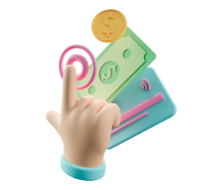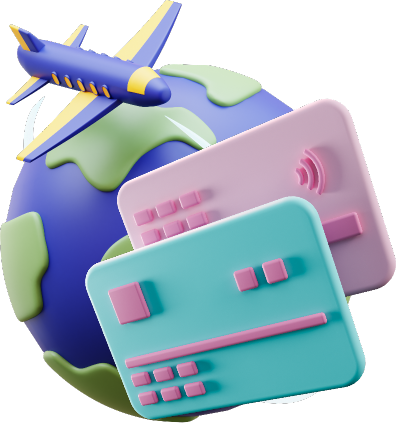Compare Prepaid Currency Cards
There are several benefits to using a prepaid currency card over other methods of paying abroad. On this page, we show you why and compare the best currency cardsThe Ultimate Guide to Prepaid Currency Cards
Ensuring you have a secure way to pay for things while away is essential. While cash is generally the most universally accepted form of payment, carrying large amounts can feel risky. A prepaid travel card offers a smart alternative, allowing you to load up with your chosen currency before you go and use it just like a regular debit card throughout your trip. This guide covers everything you need to know about prepaid travel cards and highlights our top recommendations to help you make the best choice.What Is a Prepaid Currency Card?
A prepaid currency card is essentially a smart alternative to carrying cash or using your bank cards abroad. Think of it as a "top-up" card, where you load it with money in advance, usually in the currency of your destination. You can then use it to make purchases or withdraw cash just like you would with a regular debit or credit card, but with some key advantages:
-
Lock in exchange rates
Prepaid currency cards allow you to lock in an exchange rate before you travel, so you won’t be caught out if the pound weakens while you're on holiday.
-
Spend in multiple currencies
Many cards offer the option to hold multiple currencies, meaning you can use one card for all your trips, whether you're jetting off to Europe, the US, or beyond.
-
Reduced fees
Unlike using a credit or debit card abroad, where you might be hit with fees for foreign transactions or ATM withdrawals, prepaid currency cards often come with fewer charges.
Why Choose a Prepaid Currency Card?
There are several benefits to using a prepaid currency card over other methods of paying abroad. If you are looking to save money and stay secure, they're a fantastic option. Here's why :
No Surprise Exchange Rates
With a prepaid currency card, you can lock in your exchange rate at the time you load the card. This can be a great way to protect yourself from fluctuating rates, ensuring you know exactly how much you’re getting for your pounds. CompareTravelCash.co.uk can help you find the best exchange rates available when loading your card.

Low or No Transaction Fees
When using debit or credit cards abroad, you’re often subject to a foreign transaction fee, which can range from 2-3% of the amount spent. On top of that, some cards charge a fee for cash withdrawals. Prepaid currency cards, however, tend to come with little to no foreign transaction fees, and many allow free ATM withdrawals (though this can vary by provider).

Budget-Friendly
Since you preload the card with a set amount, it’s easier to budget your holiday spending. No overspending on impulse purchases—once the card’s balance is gone, you either need to top it up or wait until your next payday!

Added Security
If your prepaid card is lost or stolen, it can be quickly blocked and replaced, offering peace of mind that your holiday funds are safe. Plus, most cards aren’t linked to your main bank account, adding an extra layer of security against fraud.

Which Prepaid Currency Card Should You Choose?
There are various prepaid currency cards on the market, each with its own set of features and fees. Here’s what to look out for when choosing the right one for your trip:
-
 Currencies Available
Currencies AvailableIf you’re travelling to multiple destinations, look for a card that supports a variety of currencies. Some of the best-known cards like Revolut or Wise allow you to hold several currencies at once, meaning you won’t need separate cards for euros and dollars, for instance.
-
 Fees
FeesPrepaid cards come with different fee structures, so it’s important to compare them before choosing one. Some cards may charge for initial loading, ATM withdrawals, or inactivity fees if you don’t use the card for a while.
-
 Exchange Rates
Exchange RatesGetting the best exchange rate is key to ensuring you get more foreign currency for your pounds. Always compare the exchange rates offered by different providers, as they can vary significantly. At CompareTravelCash.co.uk, we’ll help you compare the best rates for loading your prepaid card, so you can get the most value for your money.
Our Prepaid travel cards Review
Looking for a travel card with great rates and low fees? We’ve done the hard work and compared the best options out there. But don’t forget—it’s always worth checking how our top picks stack up against the best holiday cash rates using our handy comparison tool at CompareTravelCash.co.uk. These cards give you flexibility. Spend directly in pounds, and you’ll automatically get the exchange rate on the day of your purchase. Or, if you’d rather know exactly what you’re getting, you can lock in a rate before you travel—perfect for budgeting peace of mind! Just remember, the features and options can vary from card to card, so it’s important to understand how you can use the card you choose. For example, some cards allow you to load currency in advance while others don’t. If pre-loading is an option, simply load up your card with pounds, head to your account online or through the app, and find the ‘exchange’ option. Choose the currency, check the rate, and if you’re happy, hit ‘order.’ Your pounds will then be exchanged, and your card will be loaded with the foreign currency, ready for your tripCard 1
Our top picks all use near-perfect interbank exchange rates, which are generally a touch higher than the standard Mastercard or Visa rates. These cards can be used anywhere in the world that accepts Mastercard or Visa, so the real difference often comes down to the fees each card adds on top.
Take Card 1, for example-a card backed by HSBC. It charges a 0.2% exchange fee, but until 30th December, you can exchange up to £500 per month with no fee. That makes it a great choice if you're exchanging £500 or less. If you're exchanging more, or after the promotion ends, it's still a competitive option and could be cheaper than others for certain currencies-though it's always wise to double- check the rates.
New customers can also enjoy a £30 welcome bonus when they sign up using our link* and make a purchase of £5 or more with the physical or virtual card before 21st November. The bonus will be added to your Card 1 GBP wallet within 30 days of making the qualifying purchase.
Card 1 offers a physical card at no extra cost, with free ATM withdrawals in the UK. For withdrawals abroad, the first one each month is free, but each additional withdrawal costs £2 (or the equivalent). So, if you choose Card 1, it's smart to limit how many times you withdraw cash overseas.
Card 2
Card 2’s standard plan doesn’t charge exchange fees for most currencies from Monday to Friday UK time, but a 1% fee applies for exchanges made on weekends. You can avoid this fee by loading your card with pounds in advance and making exchanges during the week. With Card 2, you can exchange over 30 major currencies, including euros and US dollars. However, if you exchange more than £1,000 within a 30-day period, an additional 1% fee will apply.
You can use the free virtual card with digital wallets like Apple Pay and Google Pay, or you can pay a delivery fee for a physical card, which is required for cash withdrawals. The first five withdrawals each month are free (up to £200), after which a 2% fee applies, with a minimum fee of £1.
Card 3
Alternatively, Card 3 charges a small exchange fee starting from 0.35%, regardless of the time or day. The fee varies by currency—for instance, exchanging pounds to euros comes with a 0.35% fee, making it a better option than Card 2 on weekends if you’d rather not lock in an exchange rate in advance. Card 3 also offers two fee-free cash withdrawals of up to £200 each month.
Our Comparison Prepaid Travel Cards
| Card 1 | Card 2 | Card 3 | |
|---|---|---|---|
Card delivery fee |
None, including one free replacement |
Usually £4.99 |
£7 |
Uses interbank exchange rate? |
Yes, plus a 0.2% fee (no fee on £500/mth until Dec) – see its cost calculator for exact fee above |
Yes, though 1% fee at weekends and/or for Thai baht. 1% fee if exchanging over £1,000/month (i) |
Yes, plus a fee of at least 0.35% (see its cost calculator for exact fee) |
Overseas ATM withdrawal fee |
One free per month, £2 or equivalent from second onward |
First five/£200 free per rolling month, 2% after (min £1) |
Two per month free up to £200/mth, 1.75% + 50p above |
Currencies you can exchange in advance (locking in the rate) |
20 |
35 |
47 |
Fee if not used? |
No |
No |
No |
How to manage |
App |
App |
App or online |
Important. All these providers are authorised by the Financial Conduct Authority and any money you deposit is ring-fenced – Revolut and Wise use Barclays for their ring-fencing, Zing says it uses multiple banks. So, if there are problems with Zing, Revolut or Wise, the money's safe (as long as the banks they use to ring-fence still exist).
(i) If you spend at weekends (UK time) it adds a 1% fee to its rates, unless you've locked in a rate on a weekday. There's an additional anytime 1% fee on Thai baht (so 2% at the weekend) and a 1% fee on amounts more than £1,000 in a single month.
Travel Prepaid Card: Key Things to Know Before You Get One
If you’re considering a prepaid travel card for your next holiday, it’s important to be aware of a few key factors. Here’s everything you need to know to ensure you get the most out of your prepaid card abroad.

1. Lost or Stolen Card? Contact the Provider ASAP to Protect Your Cash
If your prepaid card is lost or stolen, act quickly and contact your card provider to block it and protect your funds. Most providers will issue a replacement card for a small fee, usually up to £10.
Be particularly cautious with contactless cards, as they could be used for small fraudulent transactions before they are blocked. Always notify your card provider immediately, and consider reporting the incident to local police for an incident number to claim any losses through your travel insurance.
2. Always Choose to Pay in the Local Currency
When you’re travelling, you may be asked if you want to pay in pounds or the local currency. Always choose the local currency, as dynamic currency conversion rates (when you pay in pounds) tend to be poor. Opting to pay in the local currency ensures you get the exchange rate that your prepaid card provider offers, which is typically much better.
3. Check if Your Card Supports the Currency You Need
Most prepaid cards allow you to load major currencies like euros, US dollars, or Japanese yen, but not all cards support less common currencies. Always check that the card you choose supports the currency of your destination. If it doesn’t, you’ll need to load the card with pounds and let it convert your money when you spend abroad. In this case, you’ll be subject to the exchange rate on the day of the transaction.
4. Your Money Should Be Safe if the Card Issuer Goes Bust
Prepaid card providers are required to hold your money in a ringfenced bank account separate from their operational funds. If the card issuer goes bust, your money should still be safe and retrievable from the bank or building society holding it. However, if that bank or building society goes bust, your funds won’t be protected, so it’s a good idea to check which bank your provider uses for its ringfenced accounts.
To be safe, consider only keeping enough money on your prepaid card for short-term spending rather than storing large sums for long periods.
5. Watch Out for Fees: Some Cards Charge for Not Using Them
Prepaid cards often have more fees than traditional credit or debit cards. Be sure to check for:
-
Application and replacement fees: Some cards charge to open and replace the card after it expires (often after just 12 months).
-
Monthly fees: A few cards charge a small monthly fee, which can add up over time. Transaction fees: Some cards charge for purchases or ATM withdrawals, especially abroad.
-
Inactivity fees: Many prepaid cards penalise you if the card isn’t used for 12 months, charging around £2 per month.
-
Topping up with a credit card: Using a credit card to top up your prepaid card may incur additional fees, as it’s treated as a cash withdrawal. Always use a debit card to avoid these charges.
6. Prepaid Cards Aren’t Accepted Everywhere
Although prepaid cards are widely accepted where you see the Mastercard or Visa logo, there are some exceptions. Car hire companies, for example, often won’t accept prepaid cards, or they may require a credit card for deposits. Similarly, some petrol stations and motorway toll booths might not accept them either, so always carry a backup payment option just in case.


